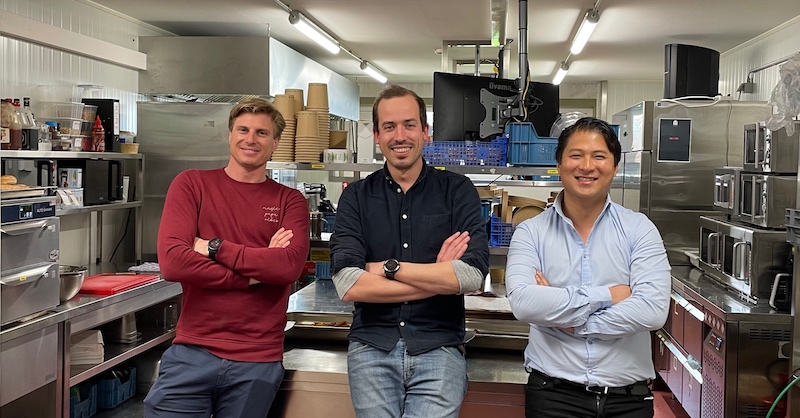Casper, Belgium’s leading ghost kitchen chain, has closed a €5 million Series A funding round. Founded in March 2020 the company has led the delivery revolution in Belgium, part of a region that, before the Covid-19 pandemic, had a small food delivery sector. Led by Amsterdam-based Slingshot Ventures and with investment from angels Jürgen Ingels, Zhong Xu and Jan Hollez, the funding will support Casper’s growth into other European markets.
A friendly ghost kitchen
Ghost, or dark, kitchens have developed in response to the growth in delivery services like Deliveroo and Uber Eats, alongside the change in eating habits forced by the pandemic and lockdowns. As their name might suggest, they are usually not public-friendly, often in low-cost locations like industrial estates. The only sign they are there might be the steady stream of delivery riders.
Slingshot Ventures principal, Tanja Kramer, noted the trend, “the dark kitchen market is growing rapidly, fuelled by the fast adoption of online food ordering and the rise of on-demand food delivery apps,” she said. “Millennials and Gen Z are increasingly accustomed to ordering food from delivery-only restaurants. Casper is the leading player in Belgium and well-positioned to grow its presence internationally.”
For restaurants, it means they could keep their restaurant kitchens and front-of-house clear for customers, and even extend their range by delivering to areas not served by a traditional restaurant. However, customers were frequently unaware of where their food was cooked. Matthias Laga, co-founder and CEO, spoke to TFN to explain why Casper is a different type of ghost kitchen.
Laga started developing the idea behind Casper when he moved to the US in 2015 and worked in a restaurant chain. “I saw ghost kitchens popping up left and right all over the city, and we were putting our concept into ghost kitchens in order to help expansion. I was convinced the model was the future of food delivery.” Moving back to his native Belgium during the pandemic, he joined forces with co-founders Peter Van Praet and Zhong Xu (the co-founder and CEO of food delivery management SaaS Deliverect) to launch Casper.
Rather than a ghost kitchen offering a single brand, each Casper location offers 10 virtual restaurants. The range includes brands developed by Casper, but also collaborations with local celebrities and brands. Casper in Belgium, for example, offers health options in partnership with a Belgian health guru, and vegetarian burgers under the Hacked brand in partnership with a vegetarian ‘butcher’. And orders can mix and match between the virtual restaurants.
“It’s putting an end to the discussion that goes on in a lot of cities every night,” explains Laga, “‘What should we order tonight? Should we do pizza, burgers, something healthy?’ We’ll do it in one order, one delivery, one transaction, everybody’s happy.”
Moving to the high street
Casper, however, has taken a different approach to ghost kitchen operations. Rather than setting up in out-of-the-way locations, they are adopting a more visible presence.
“I do not consider Casper as a traditional ghost kitchen,” says Laga. “We choose to be present in the streets.” It means that customers will not only be able to see the kitchens, but Casper will not be limited to just delivery orders. “People can walk in and place a takeout order though a self-ordering kiosk.”
Casper has also adapted its offer to meet the changing delivery market. Traditionally dominated by the younger Millennial customer, the pandemic saw older people use delivery options. “We started focusing on students and under-30s, but now we see families are our customers too,” Laga says. “I stepped away from saying who our customers are, to saying we offer every single person a third option alongside going out or cooking your own food.”
Casper has also placed a high premium on sustainability. “99% of our packaging is plastic-free, and it’s all recycled,” explains Laga. The business is also heavily focused on minimising waste. “We are very data-driven, and we can forecast what our sales will be. And the small amount we have left we put on platforms like Too Good To Go, so our waste is practically zero.”
Having become a market leader in Belgium, Casper now plans to move their focus elsewhere and is adopting a deliverable strategy for growth. Looking at growth in the Netherlands and France, they are not starting with the biggest cities, but instead at other locations, for example starting in Lille in France. “We want to get to know a new country in a smaller city, and then build on that,” Laga explains. “It’s the same approach we used in Belgium, and it has been a strategy that works for us.”
Laga is confident Casper’s approach, of offering choice with their mix of virtual brands and local partnerships, will be a winner. “If you don’t want to go to a restaurant, and you want to cook, there’s a third option. Having something delivered to your house quickly, that’s high quality, affordable, and sustainable. With that offering, we’re in a strong position.”















